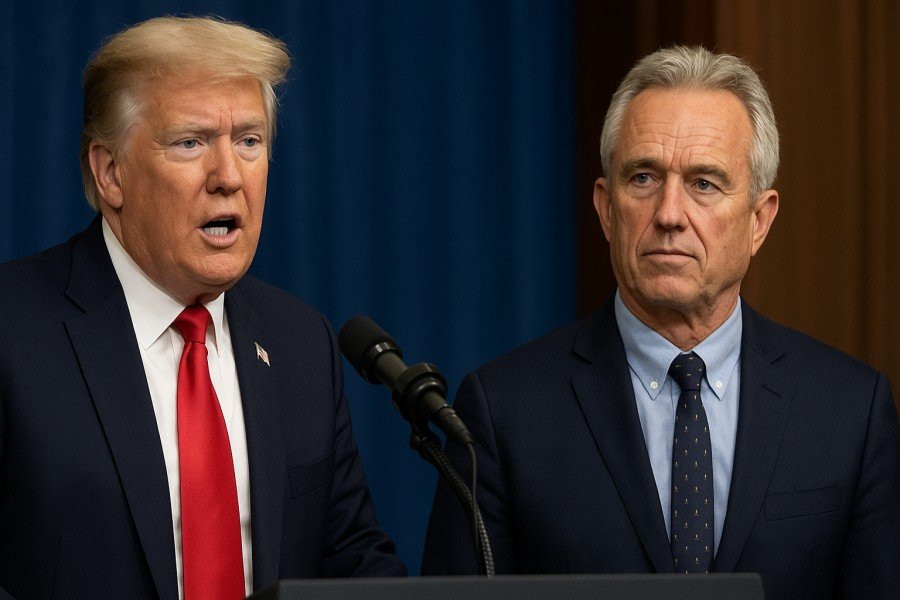The debate over children’s health has taken a sharp turn in the United States after Donald Trump and Robert F. Kennedy Jr. jointly announced a new Autism Action Plan. The announcement, which has already sparked widespread discussion among healthcare professionals, parents, and policy observers, highlights a potential connection between prenatal acetaminophen use and increased autism risk.
Both leaders, though from different political traditions, converged on one pressing issue addressing the alarming rise in autism cases and creating stronger public awareness of risk factors during pregnancy. Their message centers on the importance of transparent research, informed parental decision-making, and policies that protect the next generation.
The Core of the Autism Action Plan
The Autism Action Plan unveiled by Trump and RFK Jr. is built on three major priorities. First, the establishment of federally funded studies to investigate the prenatal impact of acetaminophen, one of the most commonly used pain and fever medications in the world. Second, a stronger monitoring framework to track autism prevalence across states. And third, expanding healthcare support and educational resources for families living with autism.
The joint statement emphasized that millions of women take acetaminophen during pregnancy under the impression that it is completely safe. However, mounting evidence from international and U.S.-based studies suggests that prolonged or high-dose exposure may be linked to neurodevelopmental issues, including autism and ADHD. This growing body of research, while not conclusive, has raised enough concern to push the issue into national policy discussions.
Prenatal Acetaminophen Under Scrutiny
The risks surrounding acetaminophen during pregnancy are not entirely new. For decades, the drug has been recommended as the safest option compared to other pain relievers. Yet recent peer-reviewed findings point to potential long-term effects on child development. The Autism Action Plan calls on the Centers for Disease Control and Prevention (CDC) and the National Institutes of Health (NIH) to lead further investigation, ensuring that public health messaging is clear and evidence-based.
Medical experts caution that while expecting mothers should not panic or abruptly stop treatment, they deserve transparent guidance about both benefits and risks. Physicians worldwide are increasingly urging balanced communication so parents can make informed choices during critical prenatal stages.
A Political Alliance Focused on Families
Trump and RFK Jr. have historically stood on opposite ends of American politics, but their shared concern over autism has created an unusual alliance. Both argue that autism is no longer an issue confined to health circles but one that directly affects education, workforce development, and economic productivity.
This framing positions autism policy as part of a broader national strategy. Just as GST reforms in India brought relief to the middle class by reshaping tax structures, Trump and RFK Jr. see autism initiatives as reforms that could bring long-term relief to American families. Drawing attention to healthcare transparency, they stress that action must go beyond rhetoric, with measurable commitments to research and family support.

The Economic and Social Stakes
The costs of autism are not limited to medical bills. Families often face reduced incomes due to caregiving responsibilities, while public education systems require additional resources for specialized programs. Reports suggest that autism-related costs in the U.S. already exceed hundreds of billions annually. By bringing this issue into the spotlight, Trump and RFK Jr. are linking health policy to broader economic stability.
This dimension echoes global debates about how health and finance intersect. For instance, just as investors closely watch startups in emerging markets to understand new growth opportunities, governments must evaluate autism policy as a determinant of social and economic resilience.
Support and Skepticism from the Medical Community
The reaction from medical professionals has been mixed. Some pediatricians and obstetricians welcome the attention to prenatal acetaminophen use, arguing that caution and research are overdue. Others caution against politicizing the issue, noting that definitive causation has not been established.
Still, the Autism Action Plan has succeeded in sparking a much-needed public conversation. With autism rates climbing and families demanding better support, the call for more rigorous investigation has struck a chord.
Global Implications of the Announcement
Health experts stress that the implications of this debate are not limited to the United States. Acetaminophen is widely available across the world, including in developing countries where monitoring systems are weaker. The Autism Action Plan may therefore serve as a catalyst for international research collaborations and new guidelines for expectant mothers globally.
Looking Ahead
Trump and RFK Jr. are betting that a bipartisan focus on autism will resonate with parents, educators, and healthcare advocates. Their warning on prenatal acetaminophen risks underscores a broader shift in health policy toward preventative awareness and family-centered support.
If the plan achieves its goals, it could help set a new standard in medical transparency, strengthen public trust, and empower families navigating the challenges of autism. For now, the announcement marks a pivotal moment in the intersection of politics, health, and parental rights a moment likely to shape policy debates well beyond 2025.
Follow Daily Fresh News and get the latest updates every day.








